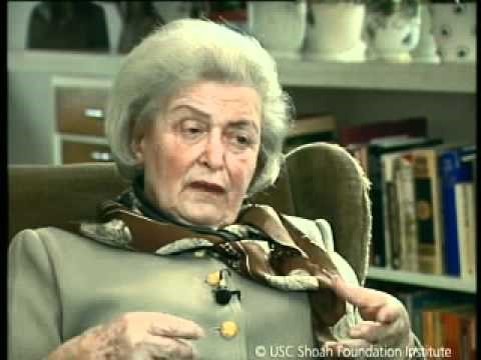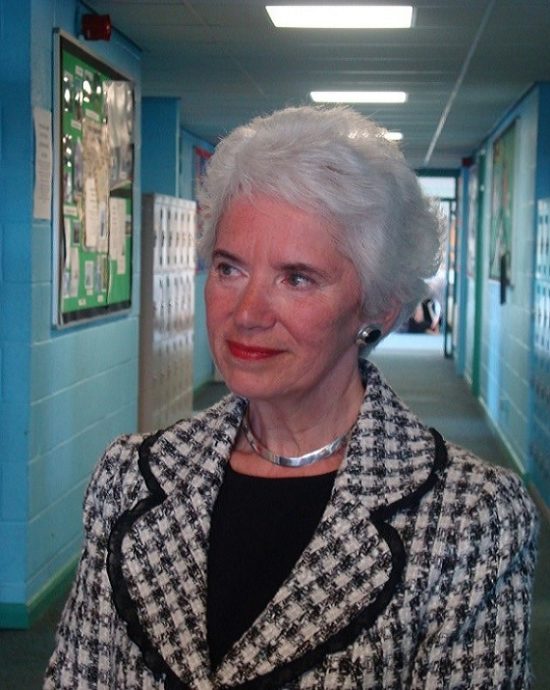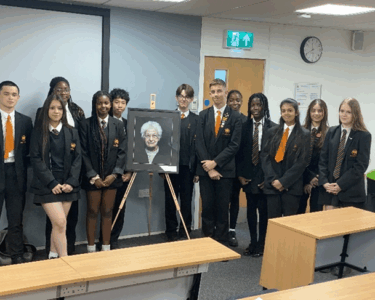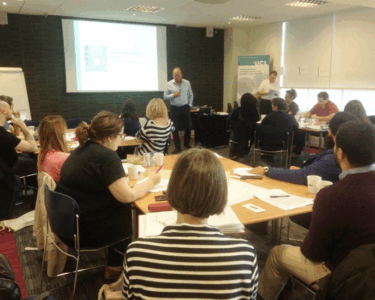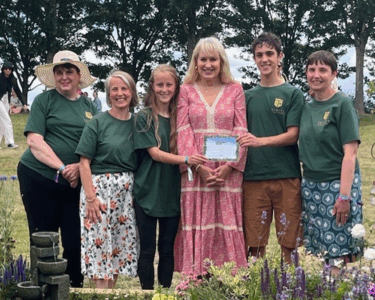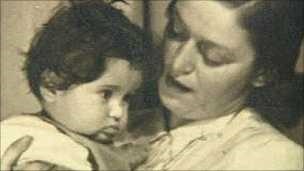
‘…if my parents had not been ‘torn from home, I wouldn’t exist!’ – survivor, Eva Clarke
It’s such an honour for me (and indirectly for my mother) to have been invited to contribute to the Centre for Holocaust Education’s Holocaust Memorial Day commemorations.
Let me start by reflecting on why I think we should remember: I often give talks and share my story, I do that
- To commemorate, to remember – ‘to keep the memory alive’ of all those millions who died, were killed (perished) during the Holocaust, especially all those and we don’t know the numbers, who have never ever had one single person remember them, because all their families were killed and their communities destroyed. And the only way people live on is through our remembering of them.
- To tell just one family’s story. As many as there are survivors and their numbers are dwindling, so there are that many different stories/experiences and despite sometimes having common elements, they are all unique.
- To enable us all to learn the lessons of the Holocaust. But just think of all the genocides since: Cambodia, Bosnia, Rwanda, Darfur and so it goes on. Tragically, not never again, but yet again!
- And the last reason is linked to the previous one, to try to counteract racism and prejudice, any form of racism and prejudice in order to try to prevent such genocides from happening again.
The theme for this year’s HMD is ‘Torn from Home’. Well, if my parents had not been ‘torn from home, I wouldn’t exist! I’m here, writing this, because I’m a survivor of the Holocaust, but only just, as I was born in the Mauthausen Concentration Camp near Linz in Austria on 29th April 1945.
My father, Bernd Nathan, was German but Jewish and fled Berlin in 1933 when Hitler came to power. He escaped to Prague, the capital of Czechoslovakia, thinking that was far enough to be safe. It wasn’t, but had he not done so, he wouldn’t have met my mother, Anka, and I wouldn’t be standing in front of you this evening. He had been an architect/interior designer and my mother had been a law student at the Charles University until the Germans closed the universities. They married on 15th May 1940, already under Nazi occupation.
In December 1941, my parents were amongst the first transports to be sent to the Terezin/ Theresienstadt Ghetto/Concentration Camp in Czechoslovakia. Being well able to work, they remained there for 3 years, an unusually long time; my mother always said luck had a lot to do with it. But, at the end of Sept. 1944, my parents’ luck ran out when my father was sent to Auschwitz and incredibly, my mother volunteered to follow him the very next day. Being the eternal optimist and as they had survived 3 years, she thought nothing could get any worse. But she never, ever saw my father again and after the war discovered he had been shot dead on a death march near Auschwitz on 18th January 1945 and as you know, it was liberated by the Russian Army on 27th January 1945.
Prior to deportation from Terezin to Auschwitz, when the Nazis discovered Anka was pregnant, they made my parents sign a document saying when the baby was born he/she would have to be handed over to be killed. In the event, my brother, Jiri/George, was born 10th February 1944, wasn’t taken away but died of pneumonia 2 months later. And his death meant my life. Because, had my mother arrived in Auschwitz holding my brother in her arms, she would have been sent straight to the gas chamber. Thankfully, Mengele didn’t realise she was pregnant when asking her ‘Bist du schwange, fesche frau?’ Are you pregnant, pretty woman and she denied it.
Anka survived Auschwitz and was sent to a slave labour camp, an armaments factory, in Freiberg, near Dresden in Germany where she spent 6 months, becoming progressively more and more starved and more and more pregnant, which was very dangerous for her. But fortunately, the Germans only realised she was pregnant after Auschwitz had been liberated, so they couldn’t send her back to face the vengeance of Dr. Mengele.
At the end of March/beginning of April 1945, when the Germans were evacuating the camps and after a horrendous train journey of 17 days in open coal wagons with no food and hardly any water, the train arrived at Mauthausen. Recognising the notorious name, Anka’s labour began and I was born on a cart between the station and the camp.
There are 3 reasons why my mother and I survived and the first is a chilling one: on 28th April, the Nazis had run out of gas for the gas chamber, my birthday is 29th., So, presumably, if the train had arrived on 26th or 27th, again I wouldn’t be sat writing this today. The second indirect reason is that Hitler committed suicide on 30th April and the third and best reason is that the 11th Armored Division of the US Army liberated the camp on 5th May. Weighing only 5st./35kg, my mother reckoned she wouldn’t have lasted much longer and neither would I, at 3lbs./1 ½kg.
As mentioned earlier, this year’s HMD theme is ‘Torn from Home’. Well, for some survivors, including my mother, ‘Returning Home’ was a grim experience. My mother said arriving at the station in Prague, at night, 3 weeks after my birth, was almost the worst experience of her 3 ½ years’ incarceration in camps. Indeed the UCL Centre for Holocaust Education features this part of my mother’s story in a hugely moving and sensitive lesson about ‘Liberation’ and ‘Home’ – It features in their teacher training to this day and I have numerous teachers tell me about their moment when the students hear from my mother’s Shoah Foundation testimony that: ‘‘…everything was dark and no electricity and no people, and nobody and nothing. And there it hit you. That you came back to nothing.”
She goes on to say: ‘…all the time it kept us alive, the thought coming home or of going home, but there is no one, no one, nothing.’
It’s clear to students and teachers alike that the thought of home and family was what had kept her going during those years, but of course, there was no one to meet us. However, my mother still had a vestige of innate optimism and thought a cousin of hers might have survived and she had! We were almost the only survivors from what had been a very large extended family. 15 members of my immediate family were killed, including 3 grandparents, my father and brother.
In 1948, my mother remarried and with my stepfather, Karel Bergman, we came to the UK and although we came legally, we might have arrived as refugees, asylum seekers or migrants. We settled in Cardiff. My mother died almost 6 years ago, aged 96 and was so pleased to learn that her story would be shared in such thoughtful, sensitive and engaging classroom materials.
Thank you.
